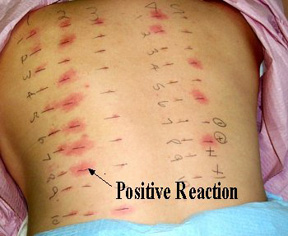 This is the second post on Allergies and what they really mean. Today we will look at the many number of symptoms that can be seen in allergies. We will also look at the difference between milk allergy and lactose intolerance. It is important to properly diagnose and manage allergies and we will look at that as well.
This is the second post on Allergies and what they really mean. Today we will look at the many number of symptoms that can be seen in allergies. We will also look at the difference between milk allergy and lactose intolerance. It is important to properly diagnose and manage allergies and we will look at that as well.
Part 1 defined allergies and looked at Hay fever and food allergies.
Signs and Symptoms of Allergies
1.) Nose
– Nasal congestion
– Runny nose
– Itchy nose
2.) Ear
– Feelings of pain
– Feelings of fullness
– Change or impaired hearing
3.) Eye
– Eye redness
– Eye drainage/watery
– Itching
– Swelling of conjunctiva
– Pain
4.) Sinus
– Sinus pain
– Sinus pressure
– Sinus drainage
– Increased mucus
5.) Airway/Lungs
– Sneezing
– Coughing
– Difficulty breathing
– Wheezing
– Inflammatory response to lungs
– Feelings of constriction
6.) Skin
– Rashes
– Itching
– Hives
– Eczema
– Dryness
– Scabbing
Causes of Allergies
Often the allergen of from the environment.
But the cause of why a person’s body is more or less susceptible to allergies comes down to genetics. Age, gender, race, and age are all things that play a part in Allergies.
Additional studies are looking at causes outside of genetics. The studies are looking at four things:
1.) Childhood diseases
2.) Environmental pollution and levels of pollution
3.) Changes to diet
4.) Levels of allergens in certain parts of the World.
Lactose Intolerance
Milk that is consumed, as many other foods, needs to be broken down into useable materials. In this case – milk or lactose is really a lactase deficiency.
Lactase is an enzyme that digests or breaks down lactose into glucose and galactose. The result will be abdominal bloating, gas, diarrhea, nausea, and/or vomiting.
Therefore, lactose intolerance has nothing to do with an allergy to milk. It is the lack of an enzyme. There is no immune response to an allergen. Milk allergy does exist but is far different than Lactose intolerance.

Diagnosis of Allergies
Continued and verified allergy response to an allergen is often enough to confirm allergies.
But in many cases, the specific allergen cannot be identified just on basic box checking on what foods or environmental factors may be involved.
When this happens, allergy testing will help narrow the search. This can be done by a skin prick test or an allergy blood test. Both are recommended by traditional guidelines and usually do a good job in identifying the specific allergen.
Management of Allergies
The problem with allergies is that it affects each person differently. Some have minimal symptoms, some are drained for half the year, and others have life threatening responses to allergies. Therefore the management is different for each of them.
Some can do nothing, they try to remove themselves from the allergen and wait for the body to realign itself.
Others must avoid the food entirely and completely. Special diet changes, planning, and even careful choices of away from home eating are essential. It could change almost everything about the way you and your family eats.
Showering, wash clothes, saline eye drops, and many other home remedies are often used first. This attempt at management not only helps but it can relieve symptoms quickly. But, it doesn’t work for everyone.
Medications can be helpful. There are a variety number of medications available from antihistamines, to steroids, to asthma and allergy medications. Immediate response oral medications, nasal medications, and even injectable medications can help relieve the symptoms of allergies.
Immunotherapy – this type of therapy has a goal to overwhelm the body by giving a gradually increasing amount of the allergen over time. Often what is seen is that the body starts to have a much less immune response to the allergen in the long run. The hypersensitivity that once was, is no longer present or at least at a far less severity.
In the end, hundreds of thousands of people, maybe including you or someone you know have allergies. It can really affect each person differently. If I get too close to a dog, I can go from normal to a severe sneezing allergy with congestion and headache. It can happen within just a few minutes. I have serious hay fever and asthma. I am very lucky that I don’t have food allergies. But my allergies are enough to drive me crazy. Several times a week I require medication. It is what it is.


